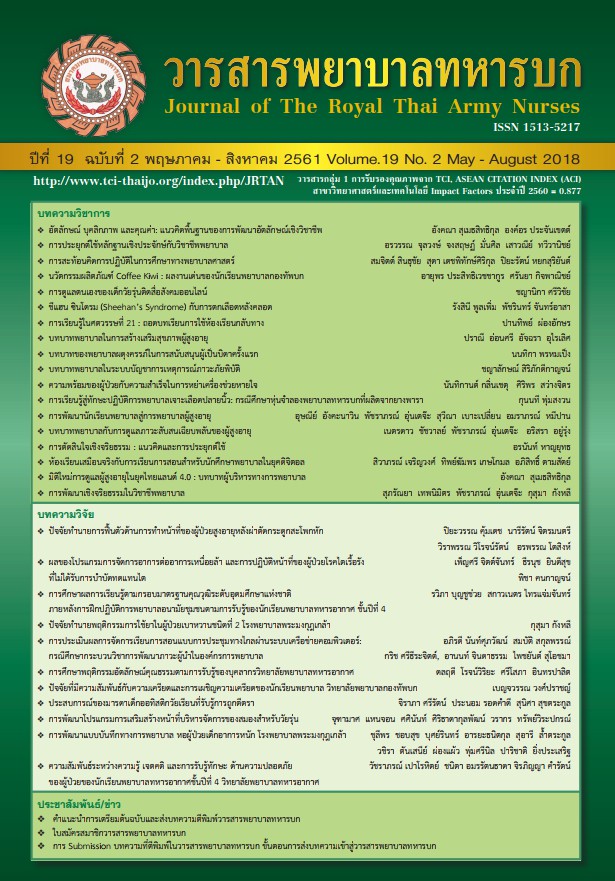Predicting Factors on Functional Recovery Post Operative Hip Fracture in Older Persons
Keywords:
hip fracture, functional recovery, older personsAbstract
The objective of this study is to predict the effects of the fear of falling, depression, and social support on the functional recovery of post-operative older persons with hip fracture using the concept of the Transition Theory. The subjects in this study were older persons who had undergone surgical treatment of hip fracture in Bhumibol Adulyadej hospital, Lerdsin hospital, Police General hospital or Somdech Phra Pinklao hospital. The purposive samples were a total of 78 older persons. The instruments used in this study consisted of questionnaires recording illness, treatment, and personal data, the Thai Falls Efficacy Scale-International (Thai FES-I), the Thai Geriatric Depression Scale (TGDS), MOS social support survey, and the Modified Barthel Activity of Daily Index (MBAI). The data were analyzed using Stepwise Regression. The results of this study revealed that 47.4% of patients had fear of falling at a high level, 93.9% had no depression, 75.6% had a social support at the highest level, 87.2% were dependent on caregivers at a low level. Depression and social support can explain the variation in functional recovery of 23.9% (R2 = .239, p < .01). The results of this study support the ideology of the Transition Theory, in that facilitating factors and inhibitory factors may affect the transition process from illness. The results showed patients who didn’t have depression, with good social support, might facilitate good functional recovery, and be good in the activities
of daily living. The fear of falling might not have inhibitory effect on transition. The results also showed that 62.8% of patients were taken care of by their children who facilitated the rehabilitation program, and even though the patients had a fear of falling it did not disturb their functional recovery. Nurses should facilitate families to be part of the patients’ care, including depression surveillance.
Downloads
References
2. Rojanasthien S, Luevitoonvechkit S. Epidemiology of hip fracture in Chaingmai. J Med Assoc Thai 2005;88:105-9.
3. Cree M, Carriere KC, Soskolne CL, Suarez- Almazor M. Functional dependence after hip fracture. Am J Phys Med Rehabil 2001;80:736-43.
4. Chick N, Meleis, AI. Transitions: a nursing concern. In: Chinn PL, editor. Nursing research methodology, Boulder, CO: Aspen Publication; 1986. p. 237-57.
5. Meleis AI, Sawyer LM, Im EO, Hilfinger Messias DK, Schumacher K. Experiencing transitions: an emerging middle-range theory. ANS Adv Nurs Sci 2000;23:12-28.
6. Visschedijk J, Achterberg W, Van Balen R, Hertogh C. Fear of falling after hip fracture: a systematic review of measurement instruments, prevalence, interventions, and related factors. J Am Geriatr Soc 2010;58: 1739-48.
7. Shyu YI, Chen MC, Cheng HS, Deng HC, Liang J, Wu CC. Severity of depression risk predicts health outcomes and recovery following surgery for hip fracture elders. Osteoporos Int 2008;19:1541-7.
8. Shyu, YI, Chen MC, Liang J. Changes in quality of life among elderly patients with hip fracture in Taiwan. Osteoporos Int 2004;15:95-102.
9. Kauppila T, Pesone, A, Tarkkila P, Rosenberg PH. Cognitive dysfunction and depression may decrease activities in daily life more strongly
than pain in community-dwelling elderly adults living with persistent pain. Pain Pract 2007;7: 241-7.
10. Shyu, YI, Tang, WR, Liang J, Weng LJ. Psychometric Testing of the MOS social support survey on the Taiwanese sample. J Nurs Res 2006;55: 411-17.
11. Nuntha Kwandee, Orpan Thosingha, Suporn Danaidutsadeekul, Kongkhet Reansuwon. Correlation between pain, depression, social support, and functional recovery of post-operative patients with hip fracture. Vajira Nurs J 2011;13:68-81.
12. Polit DF, Beck CT. Nursing research: generating and assessing evidence for nursing practice. 8th ed. New York: J.B. Lippincott; 2012.
13. Tinetti ME, Richman D, Powell L. Falls efficacy as a measure of fear of falling. J Gerontol B Psychol Sci 1990;45:239-43.
14. Ladda Thiamwong. Psychometric Testing of the fear of falling scale in Thai older adults. Srinagarind Med J 2011;29:277-87.
15. Train the Brain Forum (Thailand). Thai Geriatric Depression Scale. Siriraj Hosp Gaz 1994;46:1-9.
16. Sherbourne CD, Stewart AL. The medical outcomes survey social support survey. Soc Sci Med 1991;32:705-14.
17. Jitapankul S. Principles of geriatric medicine. Bangkok: Chulalongkorn University Printing House; 2541.
18. Ganz SB, Peterson MG, Russo PW, Guccione A. Functional recovery after hip fracture in the subacute setting. HSS J 2007;3:50-7.
19. Givens JL, Sanft TB, Marcantonio ER. Functional recovery after hip fracture: the combined effects of depressive symptoms, cognitive impairment, and delirium. J Am Geriatr Soc 2008;43:3-5.
20. Boyd CM, Landefeld CS, Consell SR, Palmer RM, Fortinsky RH, Kresevic, D. Recovery of activities of daily living in older adults after hospitalization
for acute medical illness. J Am Geriatr Soc 2008;56:2171-9.
21. Lin PC, Chang SY. Functional recovery among elderly people one year after hip fracture surgery. J Nurs Res 2004;12:44-8.
22. MacLeod M, Chesson RA, Blackleage P, Hutchison JD, Ruta N. To what Extent are carers involved in the care and rehabilitation of patients with
hip fracture? Disabil Rehabil 2005;27:1117-22.
23. Voshaar RC, Banerjee S, Horan M, Baldwin R, Pendleton N, Proctor R et al. Fear of falling more important than pain and depression for functional recovery after surgery for hip fracture in older people. Psychol Med 2006;36:1635-45.
24. Heeyoung O.Karen SF. The prognostic factors for functional recovery in elders with hip fracture. Nurs Health Sci 2000;2:237-42.
25. Sookruthai Wirojyuti, Montha Kengkarnphanith, Tharadol Kengkarnphanith, Supreeya Tonsakul. Effectiveness of program for post-operative rehabilitation among older patients with hip fracture in Phramongkutklao Hospital. J Royal Thai Army Nurs 2014;15: 187-194.
Downloads
Published
How to Cite
Issue
Section
License
บทความหรือข้อคิดเห็นใดใดที่ปรากฏในวารสารพยาบาลทหารบกเป็นวรรณกรรมของผู้เขียน ซึ่งบรรณาธิการหรือสมาคมพยาบาลทหารบก ไม่จำเป็นต้องเห็นด้วย
บทความที่ได้รับการตีพิมพ์เป็นลิขสิทธิ์ของวารสารพยาบาลทหารบก
The ideas and opinions expressed in the Journal of The Royal Thai Army Nurses are those of the authors and not necessarily those
of the editor or Royal Thai Army Nurses Association.






